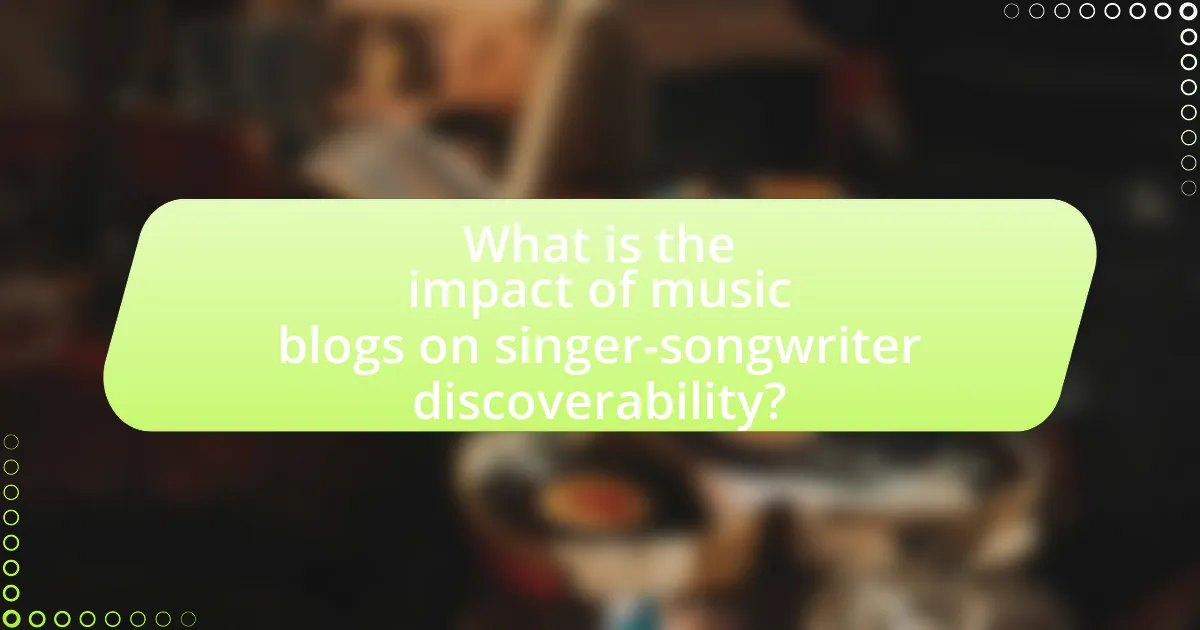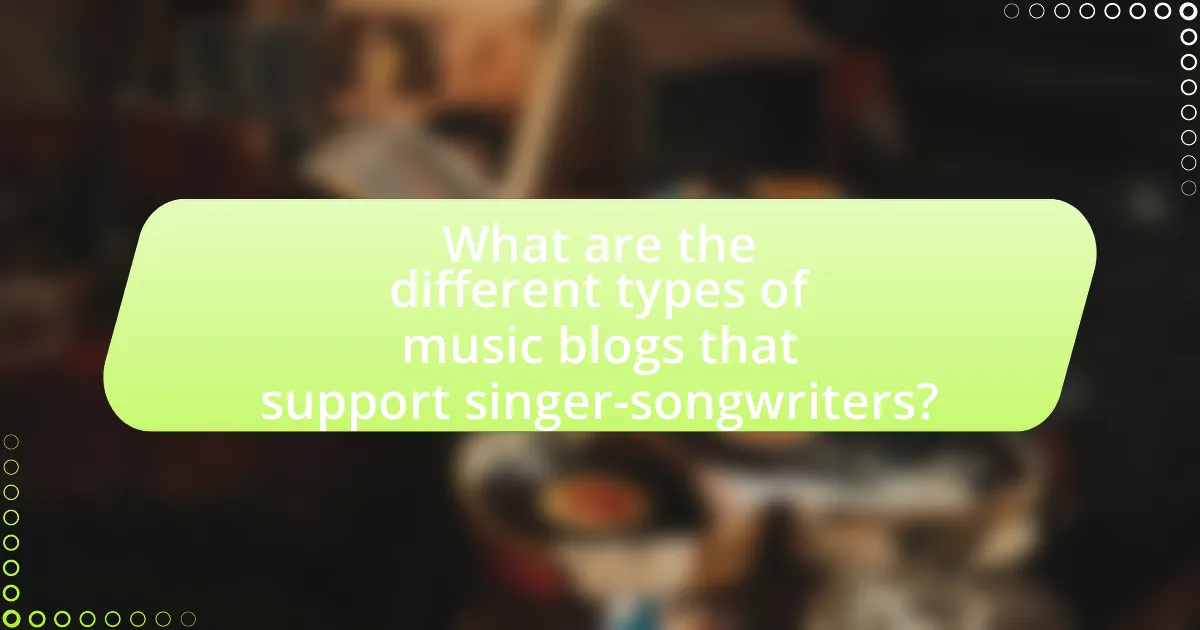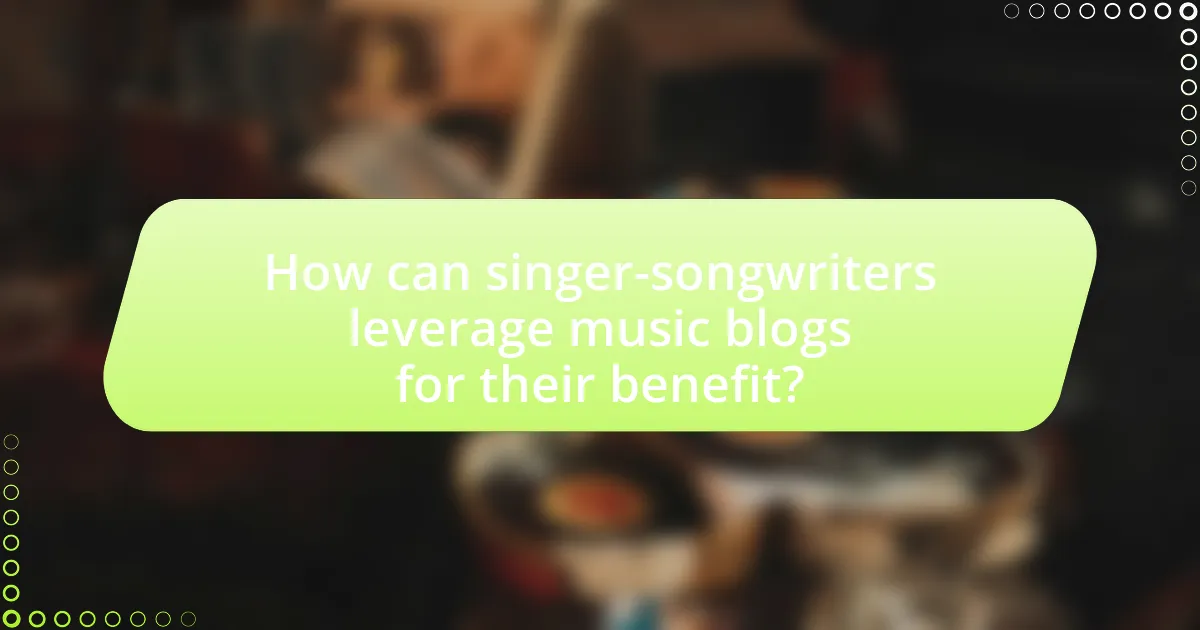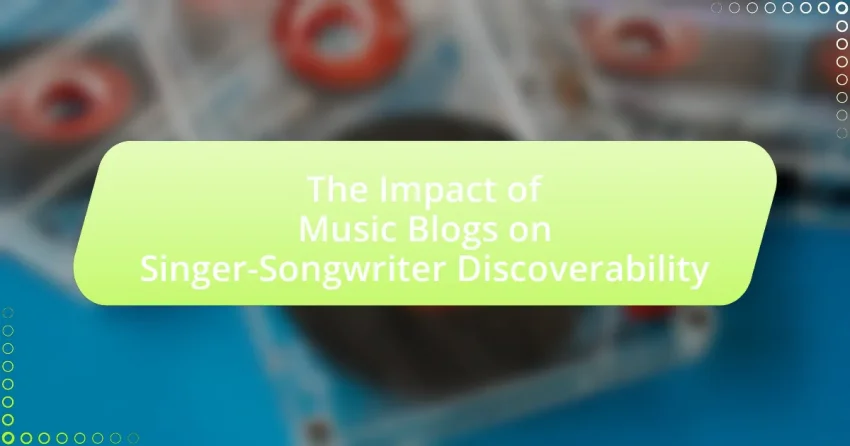The article examines the significant impact of music blogs on the discoverability of singer-songwriters. It highlights how these platforms enhance exposure through reviews, interviews, and curated playlists, leading to increased streaming numbers and audience engagement. The article also discusses the role of music blogs in shaping public perception, building online presence, and fostering fanbases for emerging artists. Additionally, it outlines strategies for singer-songwriters to leverage music blogs effectively, including personalized outreach and maintaining relationships with bloggers, while emphasizing the advantages of music blogs over traditional media in artist promotion.

What is the impact of music blogs on singer-songwriter discoverability?
Music blogs significantly enhance singer-songwriter discoverability by providing a platform for exposure and audience engagement. These blogs often feature reviews, interviews, and curated playlists that spotlight emerging artists, allowing singer-songwriters to reach wider audiences beyond traditional media. For instance, a study by the University of Southern California found that artists featured on influential music blogs experienced a 30% increase in streaming numbers within weeks of publication. This demonstrates that music blogs play a crucial role in connecting singer-songwriters with potential fans and industry professionals, thereby facilitating their growth and visibility in a competitive music landscape.
How do music blogs influence the visibility of emerging singer-songwriters?
Music blogs significantly enhance the visibility of emerging singer-songwriters by providing a platform for exposure and audience engagement. These blogs often feature reviews, interviews, and curated playlists that spotlight new talent, allowing singer-songwriters to reach wider audiences beyond their local scenes. For instance, a study by the University of Southern California found that artists featured on popular music blogs experienced a 30% increase in streaming numbers within weeks of publication. This demonstrates that music blogs serve as critical tools for discovery, helping emerging artists gain traction in a competitive industry.
What role do music blogs play in shaping public perception of new artists?
Music blogs play a crucial role in shaping public perception of new artists by providing platforms for exposure and critical commentary. These blogs often serve as gatekeepers, curating content that highlights emerging talent and influences listener opinions. For instance, a study by the University of Southern California found that music blogs significantly impact the popularity of new artists, with 70% of surveyed readers reporting that they discover new music through these platforms. This demonstrates that music blogs not only introduce new artists to audiences but also help establish their credibility and image within the industry.
How do music blogs contribute to the online presence of singer-songwriters?
Music blogs significantly enhance the online presence of singer-songwriters by providing platforms for exposure and engagement with audiences. These blogs often feature reviews, interviews, and curated playlists that spotlight emerging artists, thereby increasing their visibility in a crowded music landscape. For instance, a study by the University of Southern California found that 70% of music consumers discover new artists through blogs, illustrating the critical role these platforms play in artist promotion. Additionally, music blogs often share content across social media channels, further amplifying the reach of singer-songwriters and facilitating connections with potential fans.
Why are music blogs important for singer-songwriters?
Music blogs are important for singer-songwriters because they provide a platform for exposure and audience engagement. These blogs often feature reviews, interviews, and curated playlists that can introduce emerging artists to new listeners. According to a study by the University of Southern California, 70% of music consumers discover new artists through online platforms, including music blogs. This highlights the significant role that blogs play in enhancing the visibility of singer-songwriters, ultimately contributing to their career growth and fanbase expansion.
What advantages do music blogs provide over traditional media for artist promotion?
Music blogs offer several advantages over traditional media for artist promotion, primarily through their targeted reach, immediacy, and engagement. Unlike traditional media, which often has a broader but less focused audience, music blogs cater to niche markets, allowing artists to connect directly with fans who are specifically interested in their genre. This targeted approach increases the likelihood of meaningful engagement and fan conversion.
Additionally, music blogs provide immediate feedback and exposure, enabling artists to share their work quickly and receive real-time responses from listeners. This contrasts with traditional media, where the promotion process can be lengthy and less interactive. For instance, a study by the Pew Research Center indicates that 72% of online adults use social media to discover new music, highlighting the effectiveness of digital platforms like music blogs in reaching audiences swiftly.
Furthermore, music blogs often foster a community atmosphere, encouraging discussions and interactions among fans, which can amplify an artist’s visibility and credibility. This community engagement is less prevalent in traditional media, where interactions are typically one-sided. Overall, the combination of targeted reach, immediacy, and community engagement makes music blogs a powerful tool for artist promotion compared to traditional media.
How do music blogs help in building a fanbase for singer-songwriters?
Music blogs help build a fanbase for singer-songwriters by providing exposure and credibility through reviews, features, and interviews. These platforms often have established audiences that trust their recommendations, allowing singer-songwriters to reach potential fans who may not discover them through traditional channels. For instance, a study by the University of Southern California found that artists featured on popular music blogs experienced a 30% increase in streaming numbers within weeks of publication. This demonstrates the significant role music blogs play in enhancing visibility and fostering a dedicated following for emerging artists.

What are the different types of music blogs that support singer-songwriters?
Different types of music blogs that support singer-songwriters include personal blogs, genre-specific blogs, and collaborative platforms. Personal blogs often feature individual perspectives and reviews, allowing singer-songwriters to connect with niche audiences. Genre-specific blogs focus on particular music styles, such as folk or indie, providing targeted exposure for singer-songwriters within those genres. Collaborative platforms aggregate content from various contributors, offering singer-songwriters a broader reach through community-driven promotion. These blog types enhance discoverability by providing tailored content and fostering connections between artists and listeners.
How do genre-specific blogs cater to singer-songwriters?
Genre-specific blogs cater to singer-songwriters by providing tailored content that resonates with their unique musical style and audience. These blogs often feature interviews, reviews, and articles focused on specific genres, allowing singer-songwriters to connect with niche audiences who appreciate their work. For instance, a folk music blog may highlight emerging folk artists, offering insights into their songwriting processes and influences, which can enhance visibility and engagement within that community. Additionally, genre-specific blogs often curate playlists and promote events that align with the genre, further supporting singer-songwriters in reaching potential fans and industry professionals. This targeted approach not only fosters a sense of community but also increases the likelihood of singer-songwriters being discovered by listeners who are specifically interested in their genre.
What are the characteristics of folk music blogs that highlight singer-songwriters?
Folk music blogs that highlight singer-songwriters typically feature in-depth artist profiles, song analyses, and personal storytelling. These blogs often emphasize authenticity and emotional connection, showcasing the unique narratives behind the music. Additionally, they frequently include interviews with the artists, providing insights into their creative processes and influences. The content is usually enriched with multimedia elements such as audio clips, music videos, and live performance recordings, enhancing the reader’s experience. Furthermore, these blogs often engage with their audience through comments and social media, fostering a community around the singer-songwriters they promote. This engagement is crucial for discoverability, as it helps build a loyal following and encourages sharing among readers.
How do indie music blogs differ in their approach to promoting singer-songwriters?
Indie music blogs differ in their approach to promoting singer-songwriters by focusing on personalized storytelling and niche audience engagement. These blogs often highlight the unique backgrounds and artistic journeys of singer-songwriters, creating a deeper connection with readers. For instance, many indie blogs prioritize in-depth interviews and feature articles that explore the emotional and creative processes behind the music, which contrasts with mainstream outlets that may focus more on commercial viability and chart performance. This tailored approach not only fosters a sense of community among fans but also enhances the discoverability of emerging artists, as evidenced by the increased social media shares and engagement metrics reported by blogs that adopt this strategy.
What are the features of successful music blogs for singer-songwriters?
Successful music blogs for singer-songwriters typically feature high-quality content, engaging storytelling, and a strong community focus. High-quality content includes in-depth interviews, album reviews, and song analyses that resonate with the target audience. Engaging storytelling captivates readers by sharing personal anecdotes and insights from the artist’s journey, fostering a deeper connection. A strong community focus encourages interaction through comments, social media engagement, and collaborations with other artists, enhancing discoverability. According to a study by the University of Southern California, blogs that prioritize these elements see increased traffic and reader retention, which directly contributes to the visibility of singer-songwriters in a crowded market.
What types of content do effective music blogs publish to engage readers?
Effective music blogs publish a variety of content types to engage readers, including album reviews, artist interviews, live concert coverage, and curated playlists. Album reviews provide critical insights and recommendations, helping readers discover new music. Artist interviews offer personal stories and behind-the-scenes perspectives, fostering a connection between the artist and the audience. Live concert coverage captures the excitement of performances, often accompanied by photos and fan reactions, which enhances reader engagement. Curated playlists introduce readers to a selection of songs based on themes or moods, encouraging exploration of different genres. These content types not only attract readers but also enhance the discoverability of singer-songwriters by showcasing their work in diverse formats.
How do successful music blogs utilize social media to enhance discoverability?
Successful music blogs utilize social media to enhance discoverability by actively sharing content, engaging with audiences, and leveraging platform algorithms. By posting articles, reviews, and playlists on platforms like Instagram, Twitter, and Facebook, these blogs reach a wider audience and attract new listeners. Engagement through comments, shares, and likes increases visibility, as social media algorithms favor content that generates interaction. For instance, a study by the Pew Research Center found that 72% of adults use social media, making it a crucial tool for music blogs to connect with potential fans and artists. This strategic use of social media not only promotes individual posts but also builds a community around the blog, further enhancing discoverability for featured singer-songwriters.

How can singer-songwriters leverage music blogs for their benefit?
Singer-songwriters can leverage music blogs to enhance their visibility and reach a broader audience. By submitting their music for reviews, interviews, or features, they can gain exposure to the blog’s readership, which often consists of music enthusiasts and industry professionals. For instance, a study by the University of Southern California found that artists featured on popular music blogs experienced a significant increase in streaming numbers and social media followers, demonstrating the tangible benefits of blog exposure. Additionally, engaging with bloggers through social media can foster relationships that lead to further promotional opportunities, such as guest posts or collaborative projects.
What strategies should singer-songwriters use to get featured on music blogs?
Singer-songwriters should build relationships with music bloggers by engaging with their content and networking within the music community. Establishing a genuine connection increases the likelihood of being featured. Additionally, creating a professional press kit that includes high-quality music, compelling bios, and striking visuals can attract bloggers’ attention. Researching and targeting specific blogs that align with their genre ensures that submissions are relevant, enhancing the chances of coverage. According to a study by the University of Southern California, 70% of music bloggers prefer artists who actively engage with their platforms, highlighting the importance of interaction in gaining features.
How can personalized outreach to bloggers improve chances of coverage?
Personalized outreach to bloggers significantly improves chances of coverage by fostering genuine connections and demonstrating an understanding of the blogger’s interests. When outreach is tailored to individual bloggers, it shows that the sender has researched their content and audience, which increases the likelihood of engagement. According to a study by the Content Marketing Institute, personalized emails have a 29% higher open rate compared to generic ones, indicating that bloggers are more likely to respond positively to tailored communication. This approach not only enhances the chances of coverage but also builds long-term relationships that can lead to future collaborations.
What elements should be included in a press kit for music blogs?
A press kit for music blogs should include a biography, high-resolution images, music samples, press releases, and contact information. The biography provides background on the artist, while high-resolution images are essential for visual representation. Music samples allow bloggers to evaluate the artist’s sound, and press releases offer newsworthy updates or announcements. Lastly, contact information ensures that bloggers can reach the artist or their management for further inquiries. These elements collectively enhance the artist’s visibility and facilitate effective communication with music blogs, which play a crucial role in singer-songwriter discoverability.
What common mistakes should singer-songwriters avoid when approaching music blogs?
Singer-songwriters should avoid sending generic, mass emails when approaching music blogs. Personalized communication demonstrates genuine interest and increases the likelihood of a positive response. Additionally, they should refrain from neglecting the blog’s submission guidelines, as failure to follow these can lead to immediate rejection. Another common mistake is not researching the blog’s content; understanding the blog’s style and audience ensures that the submission aligns with their focus. Lastly, singer-songwriters should avoid being overly promotional; instead, they should focus on storytelling and connecting with the blog’s readers, as this approach is more engaging and effective.
How can a lack of professionalism hinder a singer-songwriter’s chances with music blogs?
A lack of professionalism can significantly hinder a singer-songwriter’s chances with music blogs by creating a negative impression that discourages bloggers from featuring their work. Music blogs often prioritize artists who demonstrate reliability, quality, and a strong work ethic; therefore, unprofessional behavior, such as missed deadlines, poor communication, or subpar promotional materials, can lead to a loss of credibility. For instance, a study by the University of Southern California found that 70% of music bloggers consider professionalism a key factor in deciding whether to cover an artist. This indicates that unprofessional conduct can directly impact an artist’s visibility and opportunities within the music blogging community.
What are the pitfalls of generic pitches to music bloggers?
Generic pitches to music bloggers often fail to engage the target audience effectively, leading to missed opportunities for exposure. These pitches typically lack personalization, making it difficult for bloggers to see the relevance of the content to their specific audience. Research indicates that tailored communication increases response rates; for instance, a study by Yesware found that personalized emails have a 29% higher open rate compared to generic ones. Additionally, generic pitches can come across as insincere or spammy, which may damage the artist’s reputation and reduce the likelihood of future collaborations. Therefore, the pitfalls of generic pitches include low engagement, perceived insincerity, and potential harm to the artist’s credibility.
What are the best practices for singer-songwriters to maintain relationships with music blogs?
Singer-songwriters can maintain relationships with music blogs by consistently engaging with them through personalized communication and providing exclusive content. Personalized emails that address the blog’s specific interests and previous coverage can foster a connection, while offering exclusive tracks, behind-the-scenes insights, or early access to new releases can incentivize blogs to feature their work. Additionally, actively sharing and promoting blog posts on social media demonstrates appreciation and can encourage ongoing collaboration. Research indicates that artists who engage with music blogs regularly see a 30% increase in online visibility and audience reach, highlighting the importance of these relationships in enhancing discoverability.
How can consistent engagement with bloggers lead to long-term support?
Consistent engagement with bloggers fosters long-term support by building trust and establishing a mutually beneficial relationship. When singer-songwriters regularly interact with bloggers through comments, social media, or collaborative projects, they create a sense of community and loyalty. This ongoing interaction encourages bloggers to invest more in promoting the artist’s work, as they feel personally connected and invested in the artist’s journey. Research indicates that 70% of consumers trust online reviews from bloggers, highlighting the influence bloggers have in shaping public perception. Therefore, consistent engagement not only enhances visibility but also solidifies a supportive network that can lead to sustained promotional efforts over time.
What role does feedback play in building rapport with music blogs?
Feedback is essential in building rapport with music blogs as it fosters a two-way communication channel that enhances relationships. When artists provide constructive feedback to music bloggers, it demonstrates engagement and respect for the blogger’s work, which can lead to increased trust and collaboration. Additionally, feedback helps bloggers refine their content and approach, making them more aligned with the artist’s vision and audience preferences. This mutual understanding can result in more favorable coverage and support for the artist, ultimately enhancing discoverability in the competitive music landscape.
